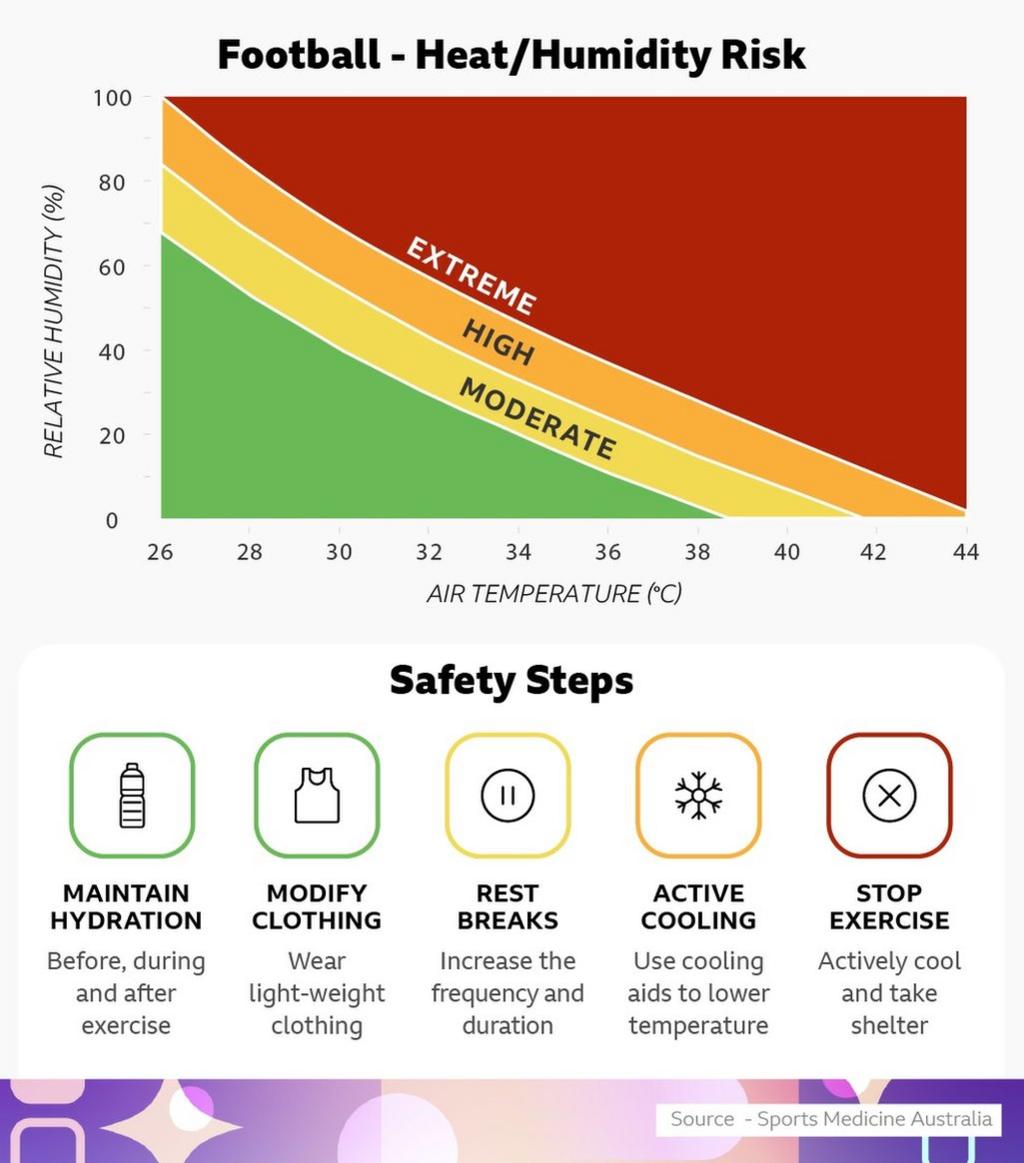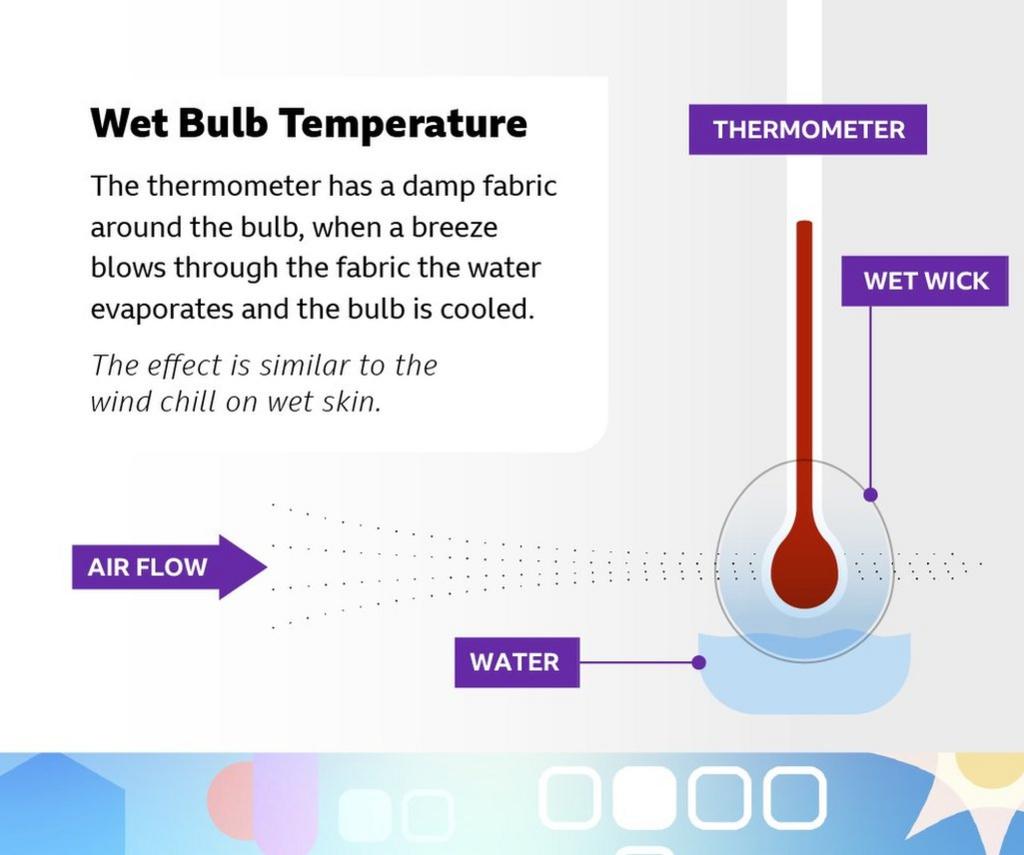Sport 2050: 60-minute matches and rolling subs - a World Cup like no other?
- Published

The 2050 World Cup will face a host of new challenges in a world hit by severe climate change
Limited numbers of travelling fans, indoor stadiums and games at night when it's cooler - will the 2050 World Cup look a lot different to a "traditional" tournament as a result of climate change?
According to our imagined future, the answer is yes.
Here are some of the differences BBC Sport thinks we can expect when the 2050 tournament gets under way.
The matches: 20-minute 'thirds' and rolling heat subs
Although games will take place in climate-controlled stadiums, training and transport challenges for each of the 24 qualifiers means larger, 40-man squads.
This allows for greater rotation and helps teams manage their rolling substitutions.
Rolling subs can now be made whenever a player's biometric readings from their active kits indicates they are approaching the 'red zone' in terms of heat or fatigue.
There had been speculation that the 2050 tournament would see a return to 30-minute halves with the clock stopping when the ball was out of play, but it will follow the same format as the previous tournament in North Africa, with matches played as three 20-minute sections, and knockout-round matches going straight to penalties in the event of a draw.
So we can expect plenty of fresh legs, dynamic tactics in each third and overall, an exciting competition.

Coaches and medical staff will have instant access to players' biometric readings using 'smart kits' to monitor the condition of players in the different climate of 2050
Eight weeks of summer football
You may remember the first World Cup to take place in the winter months was Qatar 2022, almost 30 years ago.
In the years since, of course, the World Cup has been held at different times of the year more regularly as many nations have had to meet the challenges brought by climate change, including an increasing number of natural disasters, poor air condition and extreme heat.
However, fixture congestion in the all-powerful and ever-expanding European leagues from shorter seasons due to heat, meant winter World Cups were no longer viable.
China 2050 will take place across June and July, with the final taking place on 30 July.
The tournament is longer than usual - eight weeks - because of the increased number of rest days between matches.
This allows for rearranged fixtures in the event of heat or typhoon cancellations - China's typhoon season typically runs from May to December, with most activity in July to September.
So what about the format?
China 2050 features just 24 teams - fewer flights means a smaller carbon footprint - in six groups of four, with the top two in each group and the four best third-place finishers progressing to the last 16.
It will be the first tournament to have all matches played at night. This will help host nation China address the extreme heat for fans travelling to the arenas.
With China eight hours head of the UK, kick-off times for home nations fans will be at 13:00, 15:00 and 16:00 BST.
What about fans? Will there be any there?
Here's the kicker: tickets for each game will be sold only to local citizens. Only Chinese nationals will be allowed to attend... with a few exceptions.
Foreigners will be able to attend if they can prove they have travelled in an environmentally responsible manner, e.g. via electric land vehicle or by hydro-powered boats. Flights in and out of the country will not be possible in order to keep pollution levels down.
However, organisers say that global fans won't feel like they are missing out, thanks to the innovative virtual reality technology they have introduced at all stadiums, allowing billions to plug in and watch games simultaneously, wherever they are in the world.
Of course, remote attendance is nothing new but the host nation has promised a new virtual experience in which touch and smell have been added to the sight-and-sound packages we are used to.
And this time, the enormous connected, augmented reality walls surrounding the pitch will mean players can see and hear fans when they are on the field.
Those lucky enough to be there in person will be transported safely to and from games via a new heat-resistant shuttle network - but with so few tickets available to overseas residents, the premium prices mean only high-net worth individuals have been lucky enough to secure tickets.

Why have we chosen this story? - The expert's view
David Goldblatt - journalist, academic and chair of the Board of Trustees of Football For Future
A World Cup in China in 2050, given the country's massive and politically-directed investment in football, is not implausible at all.
Indeed, it is official policy to achieve President Xi Jinping's "three wishes" - that China should qualify for, host and win the men's World Cup by 2050.
The most probable scenario is that China will have already hosted the World Cup once by then.
Sadly, the notion that China will be hosting a tournament played mostly indoors is not implausible either.
Certainly, in the worst-case scenarios in which carbon emissions are unchecked for too long, significant parts of the world - China included - will face unprecedented summer heatwaves and scorching temperatures.
However, in East Asia in particular, this is likely to coincide with periods of intense humidity as well. The physiological consequences of this combination are so injurious to health, that playing outdoors in some areas would be inconceivable.
While, no doubt, rich countries like China will be able to stage prestigious football matches in air-conditioned stadiums, the rest of the football world will be trying to play in much tougher climatic conditions outdoors.
The idea that these games could be played with just local people actually present, and the whole experience mediated by increasingly immersive technologies, in a situation where international air travel had effectively shut down, would have seemed ludicrous in 2019.
However, the experience of the Covid pandemic has suggested otherwise. Certainly, professional football, played in empty stadiums to artificial crowd noises, has retained much of its TV audience.

How to keep athletes safe in extreme heat
The strictures on air travel are also a real possibility. Approximately 70% of the carbon emissions of current World Cups is generated by spectator travel and most of that is air travel.
If the climate is in this kind of condition in 2050, it is hard to imagine that what little of the carbon we can collectively afford to emit would be reserved for what, in the end, is sports tourism.
If we want to imagine a world in which it is possible for some of us to attend these amazing sporting festivals, we need to be making massive efforts to reduce our carbon emissions now.

Playing sport in 2050 'fraught with danger'
Matt McGrath is the environment correspondent for BBC News
In China, recent research says that by 2050 the south east of the country could see temperatures go up 3.2C in the day and 2.1C at night, compared to the long-term average.
That might not seem very much but the reality is the average figure hides massive regional variations that are having huge impacts on people's lives.
Researchers expect that by the middle of the century there will be 11 more summer nights in China when temperatures don't fall below 20C.
Competing in sporting events in these types of conditions will be fraught with dangers, including heat stroke, heat cramps and heat exhaustion.
What will really worry sporting authorities is the humidity, which is expected to be a feature of future summer heatwaves in China.
Researchers also use a device called a "wet-bulb thermometer" to measure the impact of this humidity.

If the wet bulb reaches 35C, then the air is so humid that not even sweating can lower your temperature to a safe level. If these conditions are sustained, athletes will likely die, no matter their age or fitness.
Iraq's football league already has to accommodate the heat - only a few arenas have floodlights necessary for night-time games, so players from teams like Al-Kahraba are forced to play during the day. This puts them at high risk of dehydration, heatstroke and other conditions, and they suffer from hypoglycemia, breathing problems and extreme fatigue that could even reach the point of fainting. To mitigate the risks, referees pause matches every 15 minutes to allow players a sip of water and a few moments in the shade.